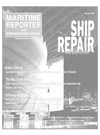
An Effective Shield from Criminal Prosecution
The maritime community has increasingly become the target of Department of Justice (DOJ) and state prosecution efforts to pursue criminal sanctions against corporations and senior management involved in maritime transportation incidents. Though many of the prosecutorial efforts involve egregious cases, some involve incidents that were previously treated as accidents. DOJ recently announced that federal enforcement actions involving environmental issues rose by almost 50 percent from 1996 to 1997. Criminal enforcement efforts often focus on highly visible companies for the maximum deterrent effect and greatest public impact.
Because of aggressive federal and state efforts targeting environmental crimes, and the severe risks and consequences of criminal prosecution, it is time for each and every company to take a hard look at their corporate environmental compliance programs. It is simply too late after an incident occurs.
Vessel owners and operators must meet a myriad of domestic and international requirements, including the International Safety Management (ISM) Code with requirements addressing environmental protection. Compliance with these requirements alone will not adequately "shield" owners and operators from prosecution. Shipowners and operators must ensure that an effective and comprehensive environmental compliance program is in place. This is crucial because the DOJ affords a company with an effective compliance program favorable consideration in criminal actions. Thus, effective environmental compliance programs must be established and smoothly running prior to an incident. But, what constitutes an effective compliance program?
Unfortunately, there is no universally accepted single standard. For example, the U.S. Sentencing Guidelines for Organizations, often referred to as the standard for determining whether a company has an effective compliance program, specifically exclude environmental crimes from its fine calculation provisions. In fact, guidelines and policies relating to environmental crimes and compliance programs are set forth in various agency documents addressing both environmental crimes and compliance programs. The five most prominent documents are as follows: DOJ Policy Statement of July 1, 1991: Contains certain environmental compliance program factors that DOJ prosecutors should consider in making decisions on criminal prosecutions for environmental violations.
• EPA Policy Statement of December 22, 1995: Encourages regulated entities to voluntarily discover, disclose, and correct violations of environmental laws, including guidance on six elements demonstrating an effective compliance program.
• Draft U.S. Sentencing Guidelines for Environmental Crimes: Sets forth seven fundamental elements that must be satisfied for a company to be granted mitigation for its commitment to environmental compliance — submitted to the Sentencing Commission in 1993 but not adopted to date.
• U.S. Sentencing Guidelines for Organizations: Defines a compliance program as one demonstrating that a company exercised "due diligence" in seeking to prevent and detect criminal conduct and requires that an organization meet seven compliance program related elements.
• Unpublished DOJ Memorandum of June 16, 1999: Details seven factors for federal prosecutors to consider in deciding whether to pursue criminal charges including whether an environmental compliance program is adequately designed for maximum effectiveness in preventing and detecting wrongdoing and whether management is enforcing the program or tacitly encouraging or pressuring employees to engage in misconduct to achieve business objectives.
The guidance notes that prosecuting a corporation is no substitute for prosecuting individuals.
At first glance a shipowner or operator appears to be facing a daunting task in determining the environmental compliance model to ensure that prosecutors will conclude that a company has established an effective environmental compliance program. Frankly, though challenging, the vagaries in determining an effective environmental compliance program can be used to the advantage of a company. It provides a company with great flexibility in developing and maintaining and effective program if it can be demonstrated that a carefully developed and executed program has been tailored and implemented to meet the practical needs of a company based on applicable guidelines. Moreover, it provides defense counsel with the opportunity to be creative in negotiations with prosecutors due to the uncertainty in applying the various guidelines.
In summary, the establishment of an effective maritime environmental compliance program is crucial to the continued success of companies engaged in marine transportation. A company should analyze the common elements of the various environmental compliance guidelines as discussed above and com- pare them against its compliance program.
First, an assessment of which elements are most commonly found in the compliance guidance documents should be completed. Second, the company should then modify its environmental compliance program as appropriately modeled after the common compliance elements found in the agency guidance.
In short, a compliance program developed in this manner will best shield or help deflect prosecutorial actions by demonstrating that a thoughtful, effective, and practical program has been developed and implemented based on applicable guidelines. The future will belong to those who plan for it.
Jonathan K. Waldron is a partner with Dyer Ellis & Joseph, Washington, D.C.
Read An Effective Shield from Criminal Prosecution in Pdf, Flash or Html5 edition of March 2000 Maritime Reporter
Other stories from March 2000 issue
Content
- A broader-based payback from R&D page: 8
- An Effective Shield from Criminal Prosecution page: 14
- MARCO Signs Contract With S.F. Bar Pilots page: 16
- MAN Acquires Alstom Diesel Engine Ops page: 16
- South Korean January Ship Orders Increase page: 17
- Dockwise Awarded Hanjung Contract page: 17
- The U.S. Navy - Reducing Shipboard Planned Maintenance page: 20
- Safety Charter Targets Old Tankers, Flags Of Convenience page: 20
- High Times Again in Singapore? page: 22
- Ship Repair Yards Ask: Where's the Funding? page: 26
- Ailsa-Troon Continues To Climb page: 27
- Irving Shipbuilding Repairs Wide Selection page: 29
- Vessels Make Pit Stop At Bay Ship page: 30
- Tampa Bay Shipbuilding - Gearing Up For A Boom page: 31
- Bollinger Puts Its Expertise To The Test page: 32
- Turbo-Technik: Rescuing A "Prinsesse" page: 33
- Smooth Sailing page: 34
- Seacoast Delivers Package To Halter page: 34
- JRC Radar Offers Plotter System page: 34
- SKYbolt Enables Real Time Processing page: 38
- Transas Moves Towards Auto Integrated Navigation page: 44
- Litton To Supply For New Passenger Ferries page: 44
- Riverboat Casino Ratings Buoyed by Regulations, Demand page: 48
- Washburn & Doughty: Developing New Process To Meet Changing Needs page: 49
- Fictitious Tugboat Character Goes Live In Canada Yard page: 51
- Bollinger opts for Oracle page: 52
- BIMCO Introduces Millennium Software page: 55
- Ship Safety Database Set Up To Avoid Future Disasters page: 55
- WindShip Technology Promises Fuel Saving s page: 56
- Recore Classified As Fireproof For Vessels page: 56
- Sandwiched Composites Offer Promise For Marine Industry page: 57
- Fiberline Offers GRP For Use In Hostile Environs page: 57
- AMT Marine To Construct Utility Boat page: 59
- Sneed Delivers Pushboat To Blessey Marine page: 59
- Alert in Valdez Harbor page: 60
- 3.MAJ Delivers Innovative Tanker page: 61
- Robert Allan Design To Be Built For Brusco page: 62
- New Surface Cleaning Process Saves Navy On Maintenance page: 65
- Jotun Goes Tin-Free page: 66
- Se-Cliff Enhances With CoreKote 2000 page: 69
- Japan: Advanced procedures sustain industry in turbulent markets page: 74
- JAMSTEC Deepsea Exploring Ship Contract Announced page: 75
- Power management with distributed intelligence page: 76
- Chamber Of Shipping Requests Entries page: 77
- The Erika oil spill - using the incident to positive effect page: 80
- NCL Board Dumped, Lund Appointed page: 92
- Litton Integrates Marine Ops In New Company page: 92


